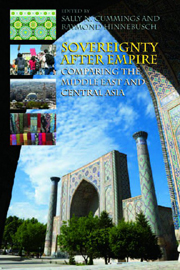Book contents
- Frontmatter
- Contents
- Acknowledgments
- Notes on the Contributors
- 1 Introduction
- SECTION I Histories of Empire and After
- SECTION II Paths to Sovereignty: Views from the Core and Periphery
- 5 Sovereignty in the Ottoman Empire and After
- 6 Mandated Sovereignty? The Role of International Law in the Construction of Arab Statehood during and after Empire
- 7 Reluctant Sovereigns? Central Asian States' Path to Independence
- SECTION III Empire and Domestic Sovereignty
- SECTION IV Empire and Popular Sovereignty
- SECTION V Empire and External Sovereignty
- Bibliography
- Index
6 - Mandated Sovereignty? The Role of International Law in the Construction of Arab Statehood during and after Empire
from SECTION II - Paths to Sovereignty: Views from the Core and Periphery
Published online by Cambridge University Press: 12 September 2012
- Frontmatter
- Contents
- Acknowledgments
- Notes on the Contributors
- 1 Introduction
- SECTION I Histories of Empire and After
- SECTION II Paths to Sovereignty: Views from the Core and Periphery
- 5 Sovereignty in the Ottoman Empire and After
- 6 Mandated Sovereignty? The Role of International Law in the Construction of Arab Statehood during and after Empire
- 7 Reluctant Sovereigns? Central Asian States' Path to Independence
- SECTION III Empire and Domestic Sovereignty
- SECTION IV Empire and Popular Sovereignty
- SECTION V Empire and External Sovereignty
- Bibliography
- Index
Summary
Although it is often claimed that international law remains peculiarly absent from the Middle East and North Africa (MENA) region with its persisting conflicts and conflagrations, its role has in fact been seminal in the (re)configuration of statehood across the region. In particular, the interrelationship between international law and colonialism has played a central role for MENA states now inhabiting a post-colonial space. This chapter therefore considers how international law has shaped and continues to shape MENA states by considering the inter-related factors of international legal personality (ILP), self-determination claims and the adjudication of boundary disputes. General cross-regional themes will be acknowledged, but the chapter will focus on three case studies in the colonial and postcolonial periods: (1) the mandate states; (2) the case of Western Sahara's (failed) self-determination bid; and (3) some of the small states of the Gulf. How can we draw upon international legal scholarship to understand the transition from colonialism to independence in these states? Were international legal arguments used in struggles over independence and how? Has international law been an enabling force for Arab states seeking independence or has it, instead, continued to uphold legacies of the colonial past so that in fact it is difficult to speak of an era after colonialism?
A growing body of literature devoted to the ways in which international law has been used as a means of colonization and the denial of non- European sovereignty will ground the chapter within wider debates about the scope and nature of a “universal” international law.
- Type
- Chapter
- Information
- Sovereignty after EmpireComparing the Middle East and Central Asia, pp. 104 - 126Publisher: Edinburgh University PressPrint publication year: 2011

